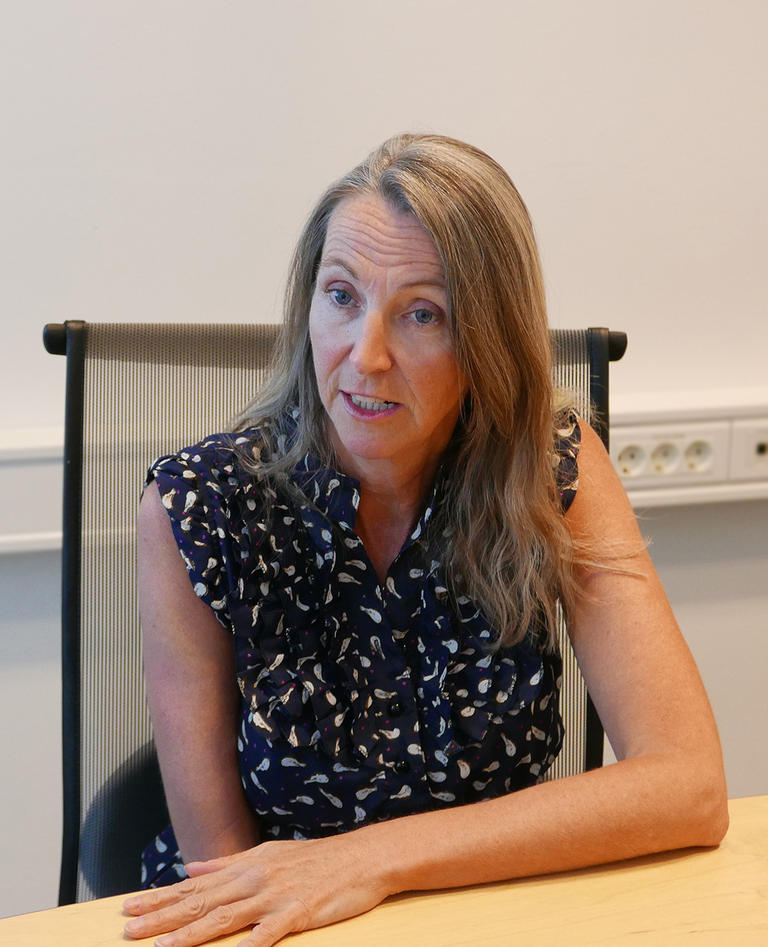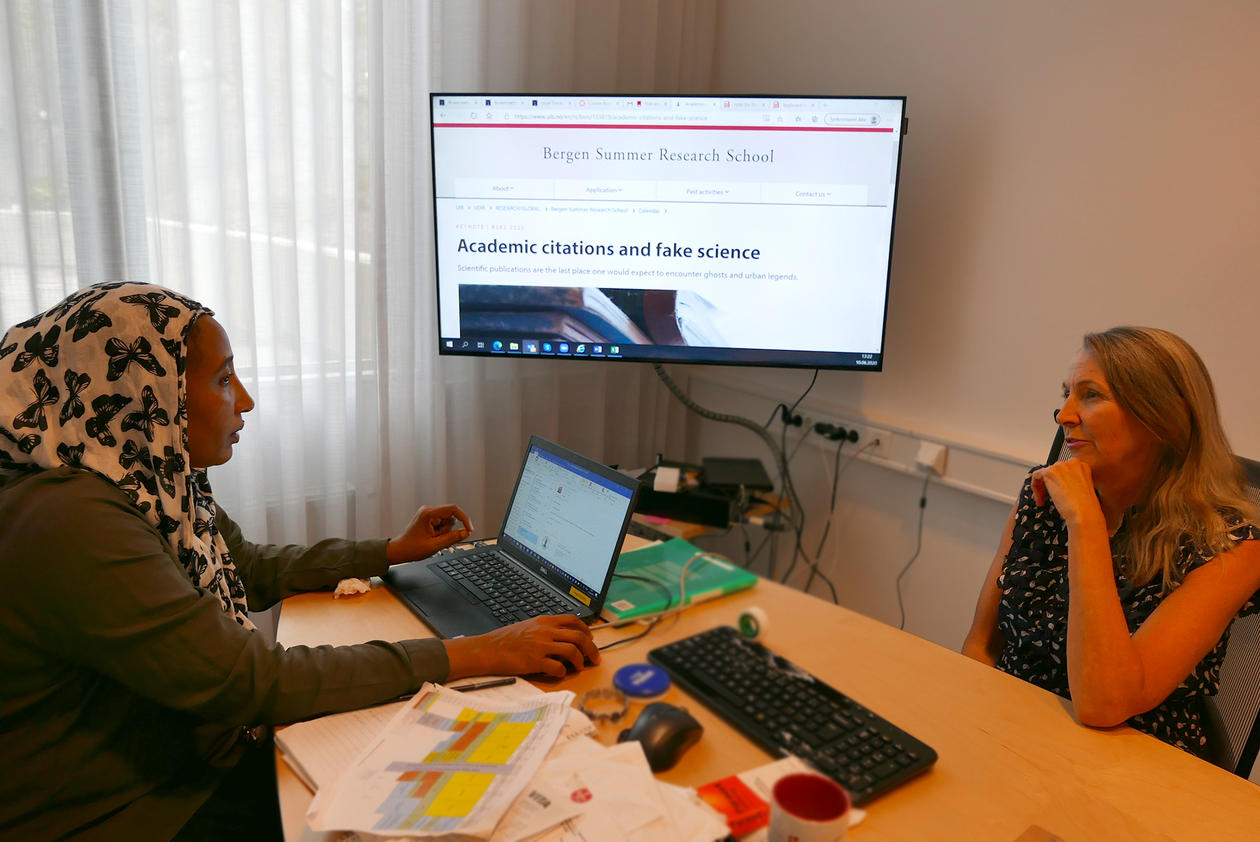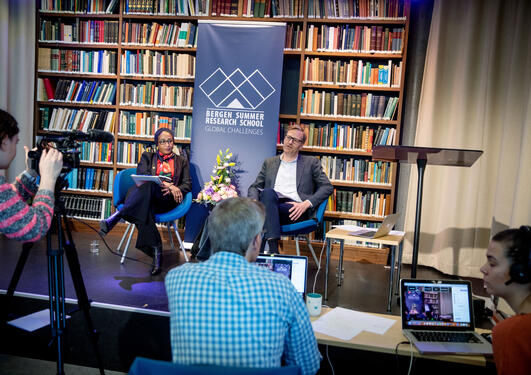Transforming the BSRS experience
The COVID-19 outbreak of 2020 forced Bergen Research Summer School (BSRS) to transform from a physical to a virtual gathering of international students.

Hovedinnhold
Since 2008, BSRS has been gathering a group of around 100 PhD Candidates in Bergen where they participate in short courses and seminars, and together address particular themes in some of the most pressing global challenges of our time. BSRS is organised by the unit for Global Challenges, but is a partnership of 5 institutions of higher learning in Bergen. Learn more about BSRS.
The consequences of global lockdown
In 2020 the world was faced with an acute global challenge; the outbreak of COVID-19 was declared a Public Health Emergency of International Concern by WHO on 30 January. Norway went into a lockdown situation 12 March. As it became apparent that the situation was going to be long-term, BSRS 2020 organisers realised that the research school was going to have to be held digitally instead of face-to-face. For the most part the teachers and students rose to the challenge. More students than usual will participate, over 130 from 6 different continents, and five of the six main courses are offered. Learn more about BSRS going digital.
As a result of national lockdowns, educational institutions around the world had to mobilise to transform their teaching from traditional to digital almost overnight. Most had begun to undertake digital innovations, but few were solely digital. At the University of Bergen (UiB), it is a testament to the collaborative hard work of Education Administrative personnel, Communication personnel, Information Technology personnel, and the teachers themselves, that the academic year 2019-2020 was able to be salvaged.
Converting to digital
Converting BSRS to being totally virtual had some special challenges. The challenges included how to enable student participation despite varying data competencies, varying national and local technological infrastructures, and living in different time zones. In addition, these students are all total strangers to one another. BSRS was extremely fortunate that they were able to employ a Digital Pedagogy Specialist, Laurie Blair, to help them with this process. Successfully transforming traditional-style, face-to-face teaching to an online format requires not only technical design competency, but a deep knowledge of effective pedagogy. Blair combines both.
Late in April, “Zooming” from their home offices in their respective lockdown locations, Blair and the BSRS teachers and organisers began with brainstorming. They continued with course design and implementation in the Canvas Learning Management Platform (LMP) used at UiB. That BSRS 2020 is up and running (8-18 June, 2020), is a testament to the strong teamwork from everyone involved. While BSRS is the result of hard efforts by many, Blair feels in hindsight that is was an asset to have someone with experience in a leadership role. After the initial online discussions about goals and ideas, she was able to design a concrete framework for the transformation process, defining tasks and roles. This helped make the work more effective, especially as time was short.
Although the experience will be evaluated, both as it is happening and afterwards, Blair can already share some take-home, best practice tips.
- Use the LMP optimally – i.e. do all communicating (teacher-student) there
- If there are institutional security barriers (i.e. for visiting students), use work-arounds such as making video material available on YouTube
- The Zoom App has fewer login issues than the browser version
- Variety is a key pedagogic principle – videos, “live” seminars, reading*, reflection / discussion groups
- Use PhD candidates and other students as dedicated assistants – in charge of the “technology” and in charge of student groups
Summer schools are more than just classrooms
Professor Håvard Haarstad, the Scientific Director of BSRS 2020, underlines the importance – and challenge – of including social and informal interactions between students. This is the “heart of any summer school”, he says. Blair underlines that making time for reading and reflection, even in a virtual summer school, enables students to participate better in online discussions. An advantage of virtual discussions, she says, is that the written input in discussion fora indicates the thought processes of the participants. In her experience, this can lead to better and richer discussions. It can also give teachers insights into the learning that is on-going. Also, she adds, if we aim to have reflective learners, we have to give them time and opportunities to reflect. Finally, Blair advocates making time for student-student discussion fora without teachers!
Laurie Blair and Håvard Haarstad shown below.

Some advantages of being virtual
Another asset of being a virtual global summer school addressing global challenges, is that it is possible to share content and participate virtually in other global online arenas. Haarstad gave an example where BSRS 2020 students are participating in some of the seminars from the International Symposium, Global Goals, at Utrecht University. In another example from his course, students from other courses in other institutions are able to participate in some lectures. This also extends the reach of the BSRS experience.
Everyone brings different competencies and experiences into the world of online learning. While Blair’s online learning design experience supports many teachers as they modify their teaching style, she finds that most students are very tech-savvy. Giving students more responsibility, she says, both as mentors and active developers is a win-win strategy.
Other advantages of having a virtual summer school include that students have easy access to world class expertise. They can study from anywhere in the world. They can study flexibly, while also on placement, working or volunteering, from different times zones and even when on lockdown! However, Blair underlines, there are advantages to face-to-face interactions. When she was finally able to come to Bergen in June, she found that discussions about problem solving and making things work were more effective in person!
There was no choice for BSRS 2020 - future summer schools will benefit from this year’s experience!


